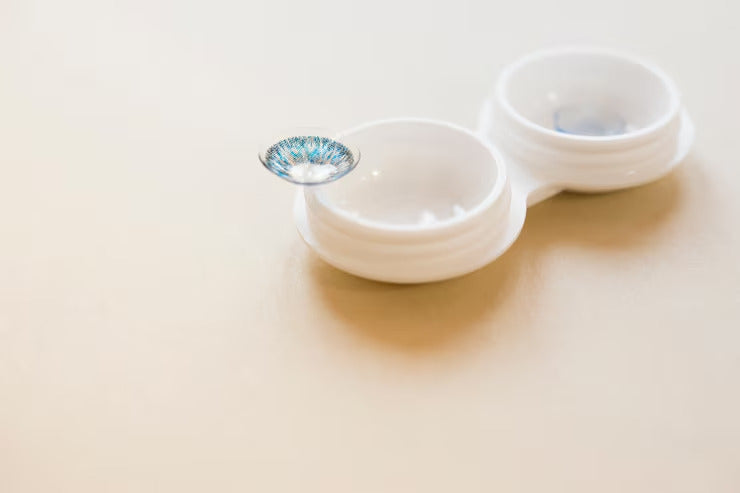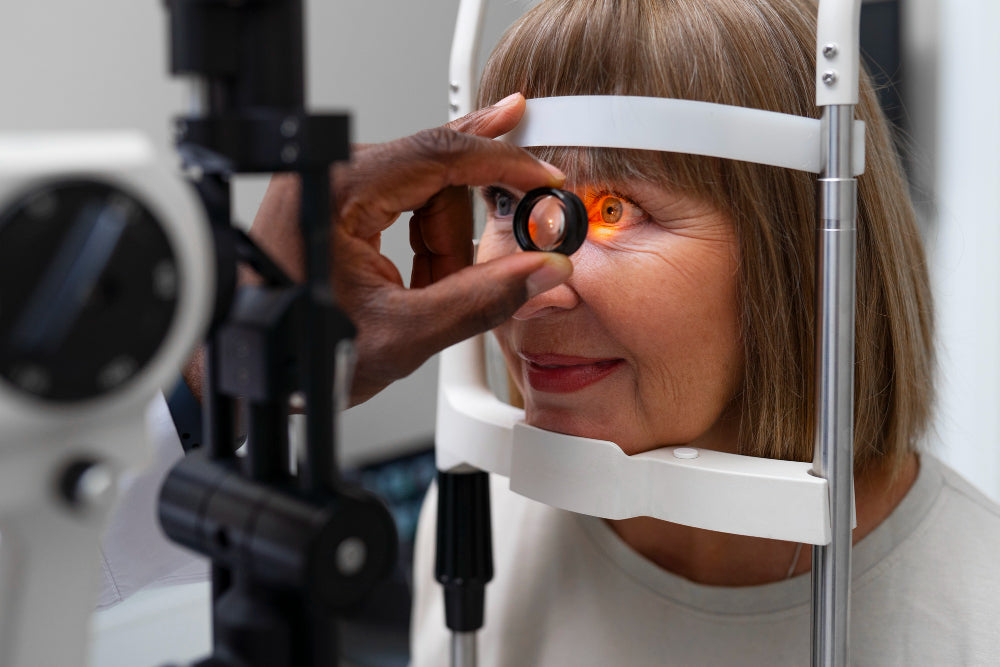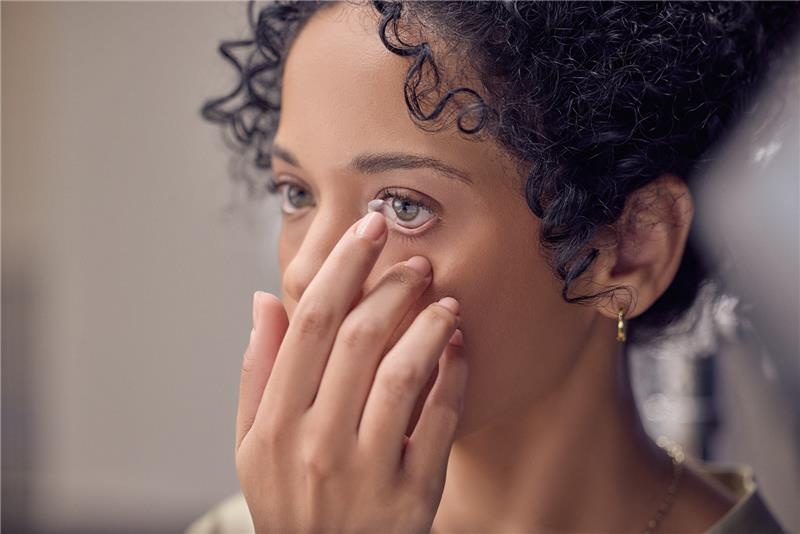You’re getting ready for bed when you realize you’ve run out of contact lens solutions. In a moment of desperation, you put your contacts in water for one night—just this once. But what are the risks?
Placing your contacts in water, even for a single night, can lead to serious consequences. Water isn’t sterile and may harbor bacteria or harmful microorganisms like Acanthamoeba, which can cause severe eye infections. This could result in irritation, corneal damage, or even permanent vision loss.
In this post, we'll explore why putting your contacts in water is never a safe option, what happens if you do, and how to properly care for your lenses to protect your eyes.
Can You Put Contacts in Water Temporarily?
No, you should never put contacts in water, even temporarily. Doing so can cause eye irritation or lead to serious infections. If your lenses have come into contact with water, it’s safest to discard them and switch to a new pair.
Water, whether tap, distilled, or bottled, is not sterile. Unlike contact lens solution, it doesn't contain the cleaning agents necessary to kill bacteria and remove protein buildup from your lenses.
When you leave your contacts in water, bacteria, and parasites can attach themselves to your contacts. These bacteria thrive in water and can cling to your contacts, leading to infections and eye irritation. Even worse, water can cause the lenses to change shape, making them uncomfortable and potentially dangerous to wear.
What Happens If You Put Contacts in Water?

The consequences are more severe than you might think. One of the biggest dangers comes from a microscopic parasite called Acanthamoeba.
Found in all types of water, from tap to lake water, this parasite can cause a severe eye infection known as Acanthamoeba keratitis. The infection is painful, difficult to treat, and can sometimes lead to permanent vision loss.
According to the Centers for Disease Control and Prevention (CDC), contact lens wearers are at a higher risk of contracting Acanthamoeba keratitis if exposed to water. The CDC also reports that approximately 85% of Acanthamoeba keratitis cases occur in contact lens wearers.
So, if you've been tempted to put your contacts in water, think again—this seemingly small decision could have long-term consequences for your eye health.
Potential Risks of Storing Contacts in Water
Absolutely. Here are some key reasons why it is bad to put contacts in water:
- Microbial contamination: Water contains various bacteria and microorganisms that can lead to infections. Even clean, sterile water is not safe for contact lenses.
- Lens damage: Water can warp and swell soft contact lenses, making them less effective and potentially harmful to your eyes.
- Increased risk of eye infections: As mentioned, Acanthamoeba keratitis is a serious risk. Symptoms of this infection include severe pain, redness, and blurred vision. If you experience these symptoms after exposing your lenses to water, seek medical attention immediately.
- Chemical reactions: Contact lenses are made from specific materials that can react negatively with water, leading to further complications.
Why Contact Lens Solution is the Only Safe Option

If you’ve ever wondered why contact lens solution is essential, here’s the key takeaway. Contact solutions are specifically formulated to clean, disinfect, and hydrate your lenses.
They remove protein deposits that naturally build up on your lenses from your tears and kill bacteria or microorganisms that could harm your eyes.
The solution also helps maintain the shape and fit of your lenses, ensuring they stay comfortable and effective. Unlike water, which can change the shape of your lenses, the right solution keeps your contacts in the best possible condition for your eyes.
Best Practices for Contact Lens Care
To keep your eyes healthy and your lenses in good condition, follow these best practices:
- Always use proper lens solution: Only use solutions specifically designed for contact lenses. Never substitute with water, saliva, or homemade solutions.
- Clean your lenses regularly: Consistently follow your eye care professional’s guidelines for cleaning and disinfecting your contact lenses.
- Avoid water activities with reusable contacts: Swimming, showering, or even splashing water on your face while wearing contacts can increase your risk of infection. If you must swim, consider wearing tight-fitting goggles. Alternately single use contact lenses can be used while swimming and discarded immediately after.
- Replace your lenses as directed: Stick to the replacement schedule advised by your eye care provider. Extending the use of your lenses beyond the recommended time frame can result in complications.
- Store lenses properly: Keep your contact lenses in a clean case and use fresh storage solutions at all times. Replace your lens case every three months to reduce the risk of contamination.
What Should You Use on Your Contacts Instead of Water?
If you’re out of contact solution and need a quick fix, a saline solution can serve as a temporary alternative. While it keeps your lenses hydrated, it doesn’t contain any cleaning agents, meaning it won’t disinfect your lenses like a multipurpose solution. It’s fine for short-term use, but it is important to get a proper contact solution as soon as possible.
For long-term care, consider these options:
- Sterile Contact Lens Solution: Specially formulated to clean, disinfect, and hydrate lenses, ensuring safety and comfort.
- Lens-Specific Cleaning Systems: Options like enzymatic cleaners or UV disinfecting cases for deeper cleaning.
- Avoid Improvisation: Never use homemade solutions, saliva, or tap water as substitutes.
- Consult Your Optometric Physician:They can recommend the best products tailored to your lenses and needs. Regular visits to your optometrist for a routine eye exam or a comprehensive eye exam are essential in maintaining your eye health and ensuring that your lenses continue to fit properly.
Final Thoughts
Can you put contacts in water? The simple answer is no. Putting contacts in water, whether for a few hours or overnight, exposes your eyes to harmful bacteria and parasites that could lead to severe infections and long-term vision problems.
It's always better to be cautious and use the proper lens solution to clean and store your contacts. If you find yourself without solution, you can opt for your glasses or store your lenses dry—but never use water.
Protect Your Eyes with Vision Source Rio

At Vision Source Rio, your eye health is our top priority. We understand how easy it is to fall into bad habits, but we're here to help you maintain the best care for your lenses and vision. If you have any questions about how to care for your contact lenses or need to schedule an eye exam, don't hesitate to reach out.
Contact us today to schedule your appointment and keep your eyes in shape! Your vision is worth the best care.





